WHIT BAZEMORE: SPEAKING FROM THE HEART
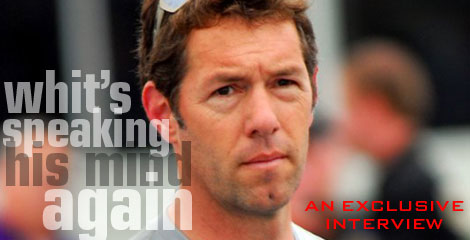 Whit Bazemore hasn't been behind the wheel of a Funny Car since 2007. It is difficult to believe a 20-time winner, including two U.S. Nationals titles still finds himself on the sidelines.
Whit Bazemore hasn't been behind the wheel of a Funny Car since 2007. It is difficult to believe a 20-time winner, including two U.S. Nationals titles still finds himself on the sidelines.Fortunately, Whit takes the situation in stride. The time away hasn't dampened his love of the sport or his desire to see the sport grow even further beyond its humble beginnings. The helmet is ready, the heart is ready and so too is the frank manner which made Whit Bazemore a real fan favorite.
Attitude's CompetitionPlus.com took the time to listen to Bazemore's take on the current status of the sport of drag racing and the NHRA
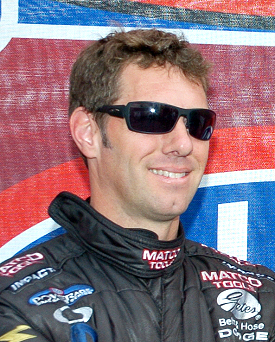 Whit Bazemore hasn't been behind the wheel of a Funny Car since 2007. It is difficult to believe a 20-time winner, including two U.S. Nationals titles still finds himself on the sidelines.
Whit Bazemore hasn't been behind the wheel of a Funny Car since 2007. It is difficult to believe a 20-time winner, including two U.S. Nationals titles still finds himself on the sidelines.
Fortunately, Whit takes the situation in stride. The time away hasn't dampened his love of the sport or his desire to see the sport grow even further beyond its humble beginnings. The helmet is ready, the heart is ready and so too is the frank manner which made Whit Bazemore a real fan favorite.
Attitude's CompetitionPlus.com took the time to listen to Bazemore's take on the current status of the sport of drag racing and the NHRA
CP: The 2010 season is about to begin but first let's examine the 2009 season which appeared to be, from an economical standpoint, rather painful. From your point of view, do you agree or disagree with that observation and the reasons behind your opinion?
WHIT: Well it probably was economically painful not for just racing, but for many, many people. I think you could see the fall out happening. Obviously, having the support of the Detroit manufacturers was a big thing especially for Pro Stock and secondly for Funny Car and they obviously have pulled way, way, back. That is money that is missing for the teams. I think the sponsorship level appears to be down across the board. Anytime that happens it makes it much harder for the teams. It makes it hard for NHRA as well because when you have healthy sponsors supporting teams they tend to promote the teams and they promote their sponsorships. When that stops happening that form of advertising disappears. It makes the sport more invisible to the public, so it has an effect on everybody. It’s not really a trickle down, it is more of a snowball effect.
Interview continues after advertisement
a d v e r t i s e m e n t
Click to visit our sponsor's website
CP: The 2010 season is going to be a 23-race schedule versus a 24-race schedule with Memphis Motor Sports Park closing. Is a 23-race 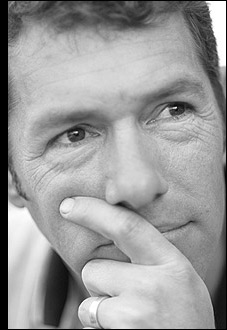 schedule a negative or could it in fact be a positive?
schedule a negative or could it in fact be a positive?
WHIT: It could definitely be a positive. It can be looked at as a negative too. On one hand when you go sell the sport you want to have as many markets as you can have. When you go in and sell a Coca-Cola or whoever it is, we’re in 18 different markets or whatever the number is, that is important. On the other hand you need to be markets that count. Memphis was a very small race; it didn’t really matter. You also need to be at facilities that show off the sport in the best possible way. That wasn’t Memphis, unfortunately. The race was under-promoted. It was never well attended. Was it a weak sister? It definitely was. Is it OK to get rid of some of those? My opinion is but Memphis needs to be off the schedule like it is. It’s a shame the track closed. It didn’t make money, so it closed. That is how capitalism works. That’s how it should be. Should Phoenix be on the schedule, absolutely not. The place is an embarrassment to the sport, the facility. It’s a great market, it could be a huge event but it’s nothing. It’s weak. There are a handful of others that should be really looked at with a discerning eye and smart decisions probably need to be made. Every time you get rid of one of those tracks it opens the door for Burton Smith to have one of his races where you can actually take the CEO of your sponsor and his wife and bring them to the event and be proud of the sport and not be embarrassed.
CP: You’ve touched on something that obviously is very important. Drag racers obviously race because that is what they love to do. But in order to race in today’s economy you need sponsorship. You need the CEO, his wife, the marketing manager and such. Has the sport supported those facts the way it should?
WHIT: Probably not, but that’s a hard question to answer. There are some facilities that cater more towards a higher end demographic than other facilities. Obviously CEOs and presidents of corporations fall into that category. Can you ask someone like that to park out in a dirt field and walk through grass and mud to come to what is inherently a noisy event? Let’s face it, this is not a PGA golf tournament. Because of that you really have to try extra hard to coddle those people and give them some luxury. Such as what NASCAR has done at many places, not all of them but many, Indy Car and Formula One look at that. That’s how you get corporate involvement. It is a two-pronged approach. You have to do that part of it and then you also have to give them a great return on investment for their product. That ROI comes from live attendance, TV ratings, and all the promotional aspects that go into making a successful marketing campaign for a product built around a driver and a racing team.
a d v e r t i s e m e n t
Click to visit our sponsor's website
CP: Based of some of the things you just said that are very important obviously to the growth of the sport, in your opinion has the 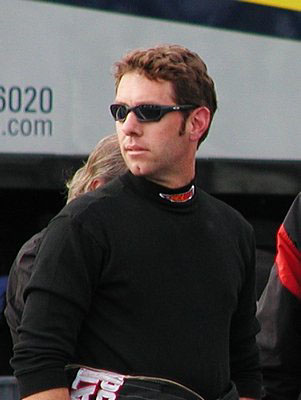 leadership of the NHRA been effective enacting policy which supports sponsor growth?
leadership of the NHRA been effective enacting policy which supports sponsor growth?
WHIT: I believe the answer is: when it has suited them they have been. There are some definite policies in the sport that hinder that growth such as exclusivity for certain companies and maybe they had to give those companies those exclusive rights to get them involved but that is a short term fix, short term gain, because at the end you need as many companies as you can have. Say you have Coca-Cola with Full Throttle and you don’t allow other energy drinks in which is what has been the case from what I understand. That takes away companies that are marketing their product through the sport and in doing so they are marketing the sport its self. They’re building the audience. For example, I watched some motocross racing a couple weeks ago with an executive friend of mine who is with Nike. Nike is involved with Motocross and he is actually my next-door neighbor, a very good friend. We’re watching the Anaheim race on prime time television live and it’s huge. They’re sponsored by Monster but I see Red Bull guys, I see other energy drink guys, but they are sponsored by Monster. There were all these different energy drinks participating. I am not picking on Full Throttle and Coke a Cola. I’m really not, but for an example in our sport you don’t have that. We had Monster on a car and they left. We had some other people and they are not there now -Rock Star, and they are not there. Any time you have a company leave the sport to me it is a huge, huge moment that has to be looked at and addressed and answered. Why did so and so leave the sport? Now we don’t have any beer cars. At one time we had 3 or 4 beer companies in our sport. Now there is zero. That is just unbelievable to me. It should never have been allowed to happen that way. Whatever it takes. Sure, Budweiser got bought by InBev. If there was the right return on investment they’d have never left. If it made great business sense they’d be there. It’s the sport’s responsibility, not just NHRA’s, but the sports responsibility in my opinion to make the value so good that no one could ever leave – or ever want to leave.
CP: One of things we discussed in a previous conversation is that unlike other sports: football, baseball, basketball and even some forms of motor sports, drag racing is a bit of a niche sport, is it not?
WHIT: It is very much a niche sport. But so is snow boarding and you have Shawn White out there making roughly, I’ve heard, ten million dollars. Let me tell you there is no one in drag racing that is netting ten million dollars. Alan Johnson gets a lot of money to run his cars. But Larry Dixon isn’t making anywhere near even a million dollars. That’s where we are. It’s very much a niche sport. But that doesn’t mean it has to be small. To me, when you stand back and look at what nitro methane drag racing is, Top Fuel and Funny Car, it’s the most dynamic, exciting, explosive, intense thing there is. When you sit in the stands and watch it - it’s just bad ass. But it is not marketed that way. It’s marketed in kind of a pansy way. Now you have drivers that don’t speak their mind. It’s just clean. It’s too f%(*&*n clean. It needs to have some dirt and some fire and some real passion and you have got to have people that hate to f%(*&*n lose. You have guys, when they get beat sometimes, you think their happy. That ‘s what I think ultimately hurts the sport. It’s just not real. It’s not real enough. It needs to be real. The opportunity is there. The potential is there. What it is - is it’s the excitement factor that is huge. It’s not sold that way. Look, three hundred miles an hour in 4 seconds, 3.8 seconds, whatever the hell it is at a thousand feet - it’s intense as hell. It should be sold out standing room only all the time.
a d v e r t i s e m e n t
Click to visit our sponsor's website
CP: Should the decision to go to a thousand feet instead have been the decision to make tracks safe at a quarter mile? Is the fan in the 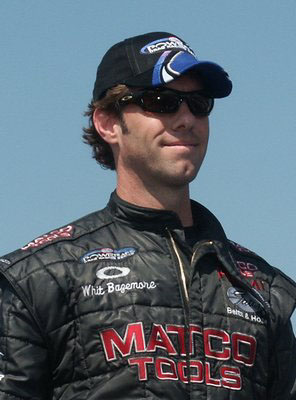 stands getting his money’s worth when the distance is only a thousand feet?
stands getting his money’s worth when the distance is only a thousand feet?
WHIT: Let me answer the second part first. Are they getting their money’s worth? That is a hard question to answer and I can’t answer it. They’re probably getting their money’s worth. They’re still seeing great racing. But is it something they like? You have to look at attendance and ratings and opinions. Read the message boards. What are the hundred people on “nitromater.com” saying; do they like it? Unequivocally the answer is no, I don’t think any fan likes it. That’s got to be taken into consideration.
WHIT: The other part of the question about safety; the tracks can always be made safer and so can the cars. I think the sport has come a long way with safety. We’ve had some tragedies, and unfortunately, that is just part of it. I can’t say some of those didn’t affect me personally, actually Eric Medlen’s death did. But if we had a safer barrier and I know what Force and Ford and all those people have said that he died from vibrations. Let me tell you I blew six tires in my career. Six tires without the car being on fire and I think eight or nine when the car was on fire. So I blew a total of eight or nine tires but six of them without the car on fire just flat out tire failures and I never had a problem. So Eric, his car broke, blew a tire and he hit the wall at a pretty steep angle and I know that cause I saw it and so you have to ask yourself with a safer barrier would he be alive today. There is a possibility in my mind, maybe not in some engineer’s mind, but as a driver and someone who saw the accident and saw the skid marks into the wall and the angle that they were. It’s like Dale Earnhardt, maybe it would have saved him.
“Now this was a long answer but you look at Scott Kalitta and what killed Scott wasn’t that the track was so short, even though it is on the short side, he hit something that wasn’t suppose to be there. Now if he hadn’t hit that, yes he still could have been killed, but it would have been from something else. There is a chance he wouldn’t have been killed. Did he go off the track at a higher rate of speed, yes. Is that an inherent danger that is always going to exist, yes. Part of the problem, as I see it, is the way the body blew. The back of the body appeared to be aiming down - the parachutes didn’t open because they blew out into the ground and the car is on fire there was no oxygen to open the parachute. The strength of the explosion and resulting fire could have also burned the brake lines burned off. What happened is tragic. It’s hard for everybody. But do we need to be racing at a thousand feet because of Scott Kalitta? My thought is no. That is not the reason to do it.
Are there good reasons to go to a thousand feet economically and safety wise? It makes some sense. Is that what the sport is? If you look at it purely from a safety standpoint a thousand feet is still dangerous. It still is f%(*&*n dangerous. That argument to me is not the reason to do it.
CP: You said some things I had no clue. You believe his brake lines could have burned, that is amazing.
WHIT: I believe they did, yes. I heard they did. I wasn’t there I didn’t see it but from what I understand and in talking to people who know, he didn’t have brakes. And I had my brakes burn off at Memphis in 2006, which was in a much smaller fire. That is when I jumped out.
a d v e r t i s e m e n t
Click to visit our sponsor's website
CP: Two big changes this year, 2010, the NHRA will very soon announce an SFI spec for all rear wheels where there will be some  commonality some mandatory use of certain materials in the wheels and wheels will have to be certified every year. Does that comfort you to hear that they’re doing that?
commonality some mandatory use of certain materials in the wheels and wheels will have to be certified every year. Does that comfort you to hear that they’re doing that?
WHIT: I am not sure what the difference is. Fifteen, twenty years ago we had to put SFI stickers on wheels. In the early 90’s, I am not up to speed on what the difference is now, I always thought they had to be certified from the beginning. That is why we had to pay extra money to have the little sticker on the wheel. So I am not sure what the difference is, maybe it is a new spec. I don’t know. I guess there was a wheel that broke with Bob Tasca last year. Other than that I am not really up to speed on it.
CP: NHRA just announced all nitro cars will have automatic shut off devices. They’re going to be RF controlled. If the driver hasn’t pulled the chutes and shut off the car by 1200 feet then there is going to be a computer box that will shut it off regardless. How do you feel about that?
WHIT: I am of the firm belief you get the best driver you can afford and you let them drive the car. One of the issues is the cars are becoming easier and easier to drive with throttle stops for the burnouts, the burst panel thing that when there is a backfire in the manifold it shuts the car off, pulls the parachute. That’s a driver’s job. To have the car shut off automatically before what used to be the end of the track, I just strongly disagree with it. I mean to have something set up if a car is in a situation like what happen to Don Garlits in Englishtown in 1986 when he went backwards. That’s a different story. We had an alcohol driver get killed at a points race a couple years ago when her car did the same sort of thing and she was knocked unconscious and it went back to the starting line at full throttle. That was extremely tragic. For that sort of thing, again, yes, it could be a very good thing. But at the end of the track, no. More and more things are being taken out of the control of the driver and that makes it easier to drive. That makes it harder for good drivers to get jobs and get paid well. Then it opens the door for people who might not be fully qualified or as good as someone else to drive the car for less money or no money or actually bring money. Then it is a trickle down effect because those people aren’t as promotable, they’re not the characters, they’re not the Gary Scelzi types who have a personality, good or bad, (laughing) but a sellable personality.
CP: 2010, is it going to be a repeat of previous years? Do you think drag racing is going to be a bit stagnant in 2010 or do you see anything out there that you think is going to be a positive step forward for the sport?
WHIT: There were some really positive things from 2009 and I’d like to think they’ll carry forward. One of those, in my opinion, is Mike Green being the crew chief for Tony Schumacher, winning the championship and beating Alan Johnson’s team. To me that was incredible. That’s a great, great story and it’s a big deal within the sport. It’s a big deal for Don and Tony and all those guys and especially for Mike Green to all of a sudden come out and he wins. How does that happen? No one gave him a chance at the beginning of the year. It was a foregone conclusion Tony Schumacher’s run is over. Tony’s a great driver, really good under pressure. Mike Green and that team rose to the occasion. I think that is a great story. Cory Mac, who is very competitive, he had a good chance there too, but made a few mistakes that cost him. Dixon had a slow start and made some mistakes early, but really got his game on very soon after that and was fighting for the championship. In top fuel, there are very compelling stories that can be used to draw attention to the sport in a very positive way.
Funny Cars are kind of the same way. There are some good stories. Unfortunately, I think the way the rules are arbitrarily enforced or not enforced on certain teams and certain people kind of discredits the sport in a big way. I think that is something that should be addressed. That was a big problem twice last year in the Funny Car class. Personally I can’t disagree enough with how those situations were handled. It’s a black eye. I don’t care what they say -- the hard core fans and even the serious casual fan they know what’s going on and they think it’s bullshit. It is a discredit to the whole sport - it really affects things. I think the sanctioning body needs to understand what that lack of credibility does to everybody from the sponsors to the fans and to the other competitors. It’s a very negative situation that needs to be rectified going forward.
a d v e r t i s e m e n t
Click to visit our sponsor's website
CP: Last year you were further away from the sport than any other time, will 2010 bring you closer to the sport or does that drift away continue?
WHIT: I last drove in 2007 and when there was a possible opportunity to race again this year, I got very, very excited about it. I had put it out of my mind for a year or two because the opportunities weren’t there and you definitely do things to protect yourself from disappointment. For me, that meant saying “I don’t care” and “I’m done I’m over it”. But I never said I retired and I never said I was not going to race again. And when a window of opportunity presented itself at the end of last season, I got very, very excited. It was an opportunity for someone to have driver with 20 something years of experience and all the enthusiasm and the desire and hunger of a rookie and that’s how I felt. But the opportunity didn’t materialize the way I had hoped, so as of right now I am not racing again.
My second possibility for being involved was to work for ESPN. I did two races last year and I had really positive feedback from the other people on the crew -- and not just my friend Mike Dunn-- but others as well, almost everyone. I thought I did terrible, but they did air some of my work and it was very, very challenging. It was hard. You can ask Brandon Bernstein for one, and Tim Wilkerson too. I fumbled through interviews with those guys. It was so embarrassing I can’t even tell you. At the end of the day I did some good things though,and I thought I would bring a lot to the table with ESPN for the telecast and it was something I really, really wanted to do. I wanted to do it and they way I do things is I jump in 100% and it’s a full on commitment. All that intensity and focus from racing would be there for television. I gave it a lot of thought. There is no question in my mind, that I would do an excellent job on TV. NO question. I wanted to do it and then it didn’t happen. It was a huge disappointment. I’ll admit it. I haven’t had so many people say no to me in such a long time. It makes you wonder, it really does. I don’t know if it is because I have an opinion, who knows. At at the end of the day I am not in the sport. For this year I really wanted to be and I tried hard to do some things and they just didn’t happen. It’s easy to feel defeated. I have had a lot of defeat before and I have been frustrated before. But never as two-time winner of the US Nationals and a twenty-time winner have I had so many people say no. It’s very frustrating. I realize to answer my own question, part of it may be me, but part of it is where the sport is. There are a lot of talented drivers that are not driving. They are not racing. There are a lot of people that hit the wall three or four times a year and get left on every weekend. They’re racing. That’s where the sport is today. That’s reality. I’ve got some other projects I am doing, but if I get the opportunity to come back in the right circumstances -- that fire still burns. Hopefully, we’ll successfully create a chance again. You know, I’ve always thought that the sport never owes anyone anything. Most people have to fight hard everyday for their place here. Look at Prudhomme, if ever there was someone who you could argue for, it is him, yet he is out for the wrong reason. Lack of financing.
| {loadposition feedback} |








